新外研版八下module 7unit1学案备课
最新初中英语外研版八年级下Module 7 Unit 1教案
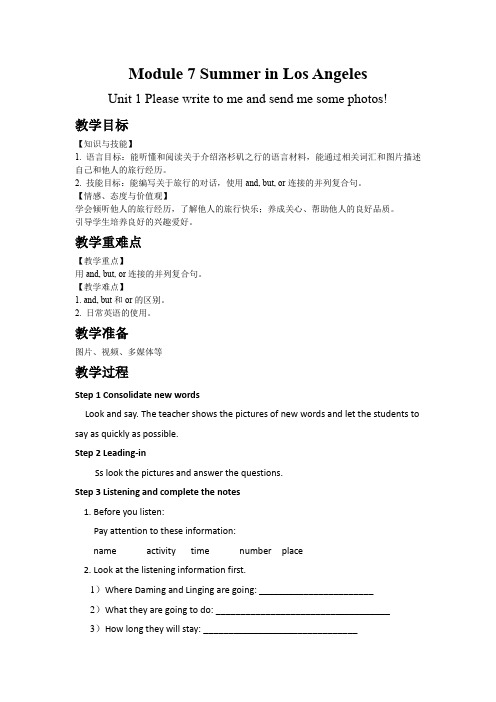
Module 7 Summer in Los AngelesUnit 1 Please write to me and send me some photos!教学目标【知识与技能】1. 语言目标:能听懂和阅读关于介绍洛杉矶之行的语言材料,能通过相关词汇和图片描述自己和他人的旅行经历。
2. 技能目标:能编写关于旅行的对话,使用and, but, or连接的并列复合句。
【情感、态度与价值观】学会倾听他人的旅行经历,了解他人的旅行快乐;养成关心、帮助他人的良好品质。
引导学生培养良好的兴趣爱好。
教学重难点【教学重点】用and, but, or连接的并列复合句。
【教学难点】1. and, but和or的区别。
2. 日常英语的使用。
教学准备图片、视频、多媒体等教学过程Step 1 Consolidate new wordsLook and say. The teacher shows the pictures of new words and let the students to say as quickly as possible.Step 2 Leading-inSs look the pictures and answer the questions.Step 3 Listening and complete the notes1. Before you listen:Pay attention to these information:name activity time number place2. Look at the listening information first.1)Where Daming and Linging are going: _______________________2)What they are going to do: ___________________________________3)How long they will stay: _______________________________4)How many students there are in the group: _________________________ 3. Fill in the blanks according to the listening.Keys: They are going to LA.They are going to do an English course.They’ll stay for about four weeks.They are going in a group of 20.Step 4 Listening1. Listen to Part 2 and answer the following questions.1) Where is Lingling going?2) Are many things more expensive in America?Keys: Los Angeles. Yes, they are.2. Now check the things Betty suggests Lingling take.1dollars 4 T-shirts 7 passport2shorts 5 pens 8 sunglasses3Jeans 6 a dictionary 9 notebooksKeys: dollars shorts pens a dictionary passport notebooksStep 5 Reading1. Find sentences in the conversation which suggest that …1) Lingling wants help.2) Betty is glad to offer help.3) Lingling asks for more help.4) Betty tells Lingling to remember something important.Keys: Can you help me?How can I help?What else?Oh, by the way, don’t forget to take your passport.2. Mark T or F.1) Lingling is leaving at the end of June. ( )2) Lingling is going to stay in China. ( )3) Betty’s going to stay in LA for four weeks. ( )4) It’s sunny and hot in LA in July. ( )5) Betty wants Lingling to write to her and send her some photos. ( ) Keys: FFFTTStep 6 Everyday EnglishLet Ss say what they have learnt in the passage.•Can you help me?•How can I help?•Well, it sounds crazy, but…•By the way, ...Step 7 Language pointsSs should master the main points from the passage in Part 2. If possible, let the students to say at first.1. I’m making a list of things for my trip.make a list “列清单“。
2022年外研版八年级下《Module7U1 (1)》精品学案
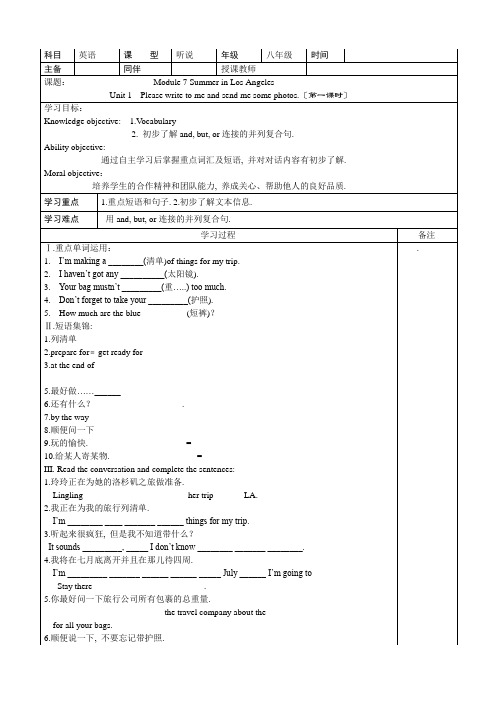
______ _______ _______, don’t forget ________ ________ your passport.[实战演练】Ⅰ. 单项选择1. They need some more potatoes, the supermarket has sold out.A. soB. yetC. butD. or2. Some students are sweeping the floor others are cleaning the windows.A. andB. orC. butD. yet3. You can go to the zoo, you can stay at home.A. andB. orC. ifD. but4. I’m too hungry eat three pieces of bread at a time.A. ifB. orC. andD. but5. I looked for my lost wallet all day found it at last.A. butB. orC. andD. soⅢ.听力训练.TASK 1:Activity one: Listen and choose the best answers1.Where are Daming and Lingling going?A. ChicagoB. New YorkC. LA(Los Angeles)2.What are they going to do?A. An English courseB.A reading courseC. A speaking course3 .How long will they stay?A. About 3 weeks.B. About 4 weeks.C. About 2 weeks4 .How many students are there in the group?A. 30 studentsB. 20 studentsC. 12 students学习目标一、掌握本单元memory, decision, mad, stand for, no way等单词和短语. 〔重点〕二、掌握并灵活运用以下句子:〔重点〕1. What does HAS stand for ?2. That’s no excuse !3. You’ve got no chance !自主预习新词自测读写单词或短语并熟记看谁记得快1.是……的缩写;代表stand for2.记忆;回忆n. memoryn. pointn. decision5.〔辩白的〕理由;借口n. excuse6.决不;不可能. no way7.公平的;合理的adj. fairn. kick9.奖牌;奖章n. medal10.生气的;恼火的adj. mad课堂导学1. What dos HAS stand for ? HAS代表什么?短语1:stand for是……的缩写;代表stand for是“动词+介词〞结构, 意为“是……的缩写;代表〞, 不能用于被动语态, 也不用于进行时态. NBA stand for National Basketball Association.NBA代表美国篮球职业联赛What do the letters UN stand for?字母UN代表什么即学即练一单项选择What exactly does the sign A ?A. stand forB. stood forC. stand upD. stood up解析:句意为“这个标志具体代表什么? 〞stand for意为“代表〞, stand up意为“站起来〞;且句子的时态为一般现在时. 应选A.2. That was a bad decision .那真是个错误的决定.单词1:decision决定decision是decide名词形式, 意为“决定〞, make a decision意为“做决定〞, 其中decision可以被good , big 等形容词修饰, make a decision to do sth.意为“决定做某事〞, 相当于decision to do sth..We made a decision to go to Beijing next week.我们决定下周去北京She is old enough to make her own decision .她已经足够大了可以自己做出决定.即学即练二一、单项选择- Dear , you need to C by next week ,to go to university at home or go abroad . You are going on eighteen. - OK , Mum, I am considering itA. make an appointmentB. make a suggestionC. make a decisionD. make a plan解析:句意为“亲爱的, 到下周为止你需要做一个决定, 在国内上大学还是出国. 你马上18岁了〞. “好的, 妈妈我正在考虑这件事. 〞, make an appointment意为“进行一次约会〞, make a suggestion意为“提建议〞, make a decision意为“做决定〞, make a plan意为“制定方案〞根据句意可知选C二、根据汉语意思完成句子在你生气的时候请不要做决定.Please don’t make a decision / make decisions when you are angry.3. No way ! 不可能!短语2:no way决不;不可能no way, 意为“决不, 不可能〞, 可以用在句中, 也可单独使用.- May I copy your homework ?我可以抄你的家庭作业吗- No way!没门!即学即练三单项选择-Mum , may I watch TV this evening ?- A You have watched it for a whole day.A. no way!B. Of course.C. All rightD. I don’t know解析:no way, 意为“没门〞, Of course意为“当然〞, All right意为“好的〞, I don’t know意为“我不知道〞. 句意为“妈妈, 今天晚上我可以看电视吗?〞“没门! 你已经看了一整天了. 〞应选A.4. He’s so mad at us that he’ll try harder to win , just to show we’re wrong!他对我们这么生气, 所以为了证明我们是错误的, 他肯定会尽力去赢!短语mad作形容词, 意为“生气的;恼火的〞, be mad at sb.意为“对某人生气〞, 相当于be angry with sb.my mother was mad at me for coming home late.我妈妈对我晚回家很生气.She was mad at her husband for forgetting her birthday.她因为她的丈夫忘了她的生日而生气拓展:mad的其他用法mad还可意为“狂热的;着迷的〞, 其后可接介词about ,on或for , be mad about…意为“对……狂热/着迷〞. To be honest , I am mad about fishing.老实说我对钓鱼着迷.He is mad on golf.他对高尔夫球着迷即学即练四用适当的介词填空1. I can’t understand why they are so mad about Apple’s iPad2.2. He was mad at missing his train.Unit 2学习目标一、掌握本单元ability , record, suffer, set up , stop sb. from doing sth. ,take pride in等单词和短语. 〔重点〕二、掌握并灵活运用以下句子:〔重点〕1. From 2021 on , he suffered a lot from his foot problem , but he did not give up.2. It is a pity that his foot problem stopped him from completing the 2021 London Olympic Games.三、能读懂关于体育活动和运发动的对话和文章, 运用本单元学到的知识和自己的体会写一篇介绍体育运发动的短文.自主预习一、英汉互译1.跳高high jump2.设立;创办set up3.受〔某种〕病痛折磨;因……而受苦suffer…from …4.first place 一等奖5.阻止某人做某事stop sb. from doing sth.6.take pride in 感到自豪7.同时at the same time8.break the Olympic Games record 打破奥运会纪录.二、用所给词的适当形式填空1. Liu Xiang was encouraged at first to train (train) for the high jump.2.In 2001, a special programme was set up to help young sportsmen (sportsman) and sportswomen (sportswoman).课堂导学1. Liu Xiang was encouraged at first to train for the high jump.起初, 刘翔被鼓励进行跳高训练.短语encourage sb. do sth., 意为“鼓励某人做某事〞, 其被动形式为be encouraged to do sth., 意为“被鼓励做某事〞. encourage作动词, 意为“鼓励〞, 其反义词为discourage〔使气馁〕.I was encouraged to work hard.我被鼓励努力学习The coach encourages the players to try their best to win the football game.教练鼓励球员们要竭尽全力赢得这次足球比赛即学即练一、单项选择Jessica’s parents always encourage her C out her opinions.A. speakB. speakingC. to speakD. will speak解析:encourage sb. to do sth., 意为“鼓励某人做某事〞. 应选C.二、根据括号内的汉语提示用句末括号内的英语单词完成句子- Is the teacher pleased with your chemistry study ?- Yes , He encourages me to make greater progress (鼓励我取得更大的进步) in it next term. (encourage) 2.In 2001, a special programme was set up to help young sportsmen and sportswomen.2001年, 为了帮助年轻的运发动们一个特殊的工程成立了.短语2:set up 设立创办set up, 意为“设立, 创办〞, 可指一切具体或抽象事物〔如学校、机构、医院、设施等〕的建造或建立. 其中up为副词, 后接名词作宾语时, 名词可放在短语中间, 也可放在短语后边;接代词作宾语时代词必须放在短语中间.We need to set up more charities.我们需要创办更多的慈善组织The government has set up a working party to look into the problem.政府成立了一个工作组来调查这个问题即学即练二一、单项选择The company wants to B a school for the poor children.A. put offB. set upC. call inD. look after解析:句意为“这个公司想为贫穷的孩子建立一所学校〞. Set up(建立)符合题意. 应选B.二、根据汉语意思完成句子那个乒乓球俱乐部是去年建立的.That ping-pong club was set up last year.3. His ra ces were recorded , and he was compared with the word’s best sports stars.他的比赛被记录下来, 并与世界上最好的运动明星进行比较.单词1:record记录record作动词, 意为“记录〞.Remember to use the camera to record the sunrise.记得用照相机记录日出的过程Recording the voice by the tape is a very great invention.用磁带记录声音是一项非常伟大的创造拓展:record还可作可数名词, 意为“纪录;记载〞. 有关record的常用短语有:set a record创造纪录; set a world record 创造一项世界纪录; break the record打破纪录; keep a record记录下来.He set a record for eating 45 eggs in two minutes他创下两分钟吃45个鸡蛋的纪录She did very well , but she failed to break the record.她做得很好可是没能打破纪录即学即练三单项选择According to your father’s will , you have to B a record of every penny you spend , including bus fares. A. make B. keep C. have D. set解析:句意为“根据你父亲的意愿, 你必须记录你花的每一分钱, 包括公交费用〞, keep a record意为“记录下来〞所以选B.4.From 2021 on ,he suffered a lot from his foot problem , but he did not give up.从2021年以来他饱受脚伤折磨但他从不放弃.短语3:suffer…from…受某种病痛折磨;因……而受苦suffer作动词, 意为“患有疾病等;经受〞. suffer…from…是固定词组, 意为“受某种病痛折磨;因……而受苦〞.He suffered a great deal from cold and huger.他承受饥寒之苦This kind of medicine can stop many people suffering from cancer.这种药能使很多人免受癌症折磨即学即练四单项选择Children who B learning disabilities should be given more attention.A. give inB. suffer fromC. go throughD. care about解析:句意为“遭受学习障碍的孩子应被给予更多的关注〞, give in意为“屈服, 让步〞, suffer from意为“遭受痛苦, 苦难〞, go through意为“经历, 度过〞, care about意为“担忧, 关心〞. 应选B.5. It is a pity that his foot problem stopped him from completing the 2021 London Olympic Games.很遗憾他的脚伤使他没法完成年的伦敦奥运会.短语4:stop sb. from doing sth.阻止某人做某事stop作动词, 意为“停止, 阻止〞. 常用短语stop sb. from doing sth., 意为“阻止某人做某事〞.The heavy snow stopped him from coming to our party.这场大雪使他未能前来参加我们的聚会I want to stop him from running after the ball.我想阻止他追着球跑拓展prevent …(from) doing sth.和keep …(from) doing st h.都有“阻止……做某事〞之意. 在被动句中, 这三个短语中的from均不能省略.What can stop us (from) going if we want to go?= What can prevent us (from) going if we want to go ?= What can keep us (from) going if we want to go ?如果我们想去有什么能阻止我们呢即学即练五单项选择The Great Green Wall can stop the wind and sand C to the rich land in the south of China.A. moveB. to moveC. from moving解析:stop sb./sth. from doing sth., 意为“阻止某人/某物做某事〞. 句意为“绿色防护林阻止风沙侵入南方肥沃的土地〞. 应选C.6. But he is still a symbol of courage and success , and we continue to take great pride in him.但他仍然是勇气和成功的象征, 我们仍然为他感到十分骄傲.短语5:take pride in感到自豪take pride in相当于be pride of, 意为“感到自豪〞, 后面可接名词或动名词. 在该短语中pride前可用great 等词修饰, 表示程度.China is a country with a long history . We all take pride in our motherland.中国是一个历史悠久的国家. 我们都为我们的祖国感到自豪.We take pride in offering the best service in town.= We are proud of offering the best service in town.我们以能提供全镇最好的效劳而自豪即学即练六根据汉语意思完成句子他的父母对他做的每件好事感到自豪His parents take pride in everything good he does.Unit 3学习目标掌握一般过去时的被动语态并学会灵活运用. 〔重点〕Daming wasn’t chosen for the team last time.He was invited to competition around the world.自主预习将以下句子改为被动语态1. They asked me to swim on Friday afternoon.I was asked to swim by them on Friday afternoon.2. Do they make this kind of machine in Beijing?Is this kind of machine made in Beijing?3. Their teacher didn’t see them eat snacks in class yesterday.They weren’t seen to eat snacks in class by their teacher yesterday.课堂导学1.What method do the sportspersons use to prepare for the Olympic Games?运发动用什么方法为奥运会做准备?短语prepare 作动词, 意为“准备〞, 后接名词或代词作宾语, 表示准备的内容. prepare for sth.意为“为某物/某事做准备〞, 表示准备的目的.When we arrived home , my mother hasn’t prepared dinner for us.当我们到家时我妈妈还没有为我们准备晚餐How do I prepare for the exams ?我应该怎样备考拓展:prepare的其他常用结构(1)prepare to do sth., 意为“准备做某事〞.Henry is preparing to leave for Australia.亨利正准备动身去澳大利亚(2)prepare sth. for sb.相当于prepare sb. sth., 意为“为某人准备某物〞.Her mother prepared her a birthday present.= Her mother prepared a birthday present for her.她妈妈为她准备了一份生日礼物即学即练一将句子译成英语必须用上所给的提示词上周这时候我们正在为考试做准备. 〔prepare for〕We were preparing for the exam(s) (at) this time last week.2. More and more people take part in the Paralympics.越来越多的人参加残奥会.短语2:take part in 参加take part in, 意为“参加〞, part 前一般不用冠词,但part前有形容词修饰时,要用不定冠词.He take an active part in many school activities.他对参加学校的活动很积极辨析:take part in与join in的区别(1) take part in指参加会议或群众性活动等, 并在活动中发挥作用.We’ll take part in social practice during the summ er vacation.暑假期间我们将参加社会实践(2)join 意为“参加, 参加〞, 指参加某个团体或组织等, 成为其成员之一.When did your brother join the army ?你哥哥什么时候参军的(3)join in多指参加小规模的活动, 如球赛、游戏等, 常用于日常口语, 可以和take part in互换. Why didn’t you join in the talk last night.昨晚你为什么没参加座谈即学即练二一、单项选择Many young people took part in A trees on Tree Planting Day.A. plantingB. plantsC. to plantD. plant解析:take part in, 意为“参加〞, 其后接动词时用动名词形式. 应选A.二、用join或take part in的适当形式填空1. The children planted more trees and flowers after they joined Greener China.2. How many countries will take part in the World Cup ?语法规律总结一般过去时的被动语态被动语态由“助动词be+及物动词的过去分词〞构成, 人称、数和时态的变化是通过助动词be的变化表现出来的.1.一般过去时的被动语态的陈述句结构为“主语+was/were+(not)+及物动词的过去分词+其他〞.The house was built in 2021.这所房子建于2021年Jim was not invited t o Linda’s birthday party.吉姆没有被邀请去参加琳达的生日聚会2.一般过去时的被动语态的一般疑问句结构为“Was/Were+主语+及物动词的过去分词+其他〞.Were the flowers planted last spring ?这些花是去年春天种植的吗3.一般过去时的被动语态的特殊疑问句结构为“特殊疑问词+was/were+主语+过去分词+其他〞.When was the sports meeting held ?运动会什么时候召开的即学即练一、单项选择1. – Who designed this game?- It C by Tom in 1999.A. is designedB. designsC. was designedD. designed解析:主语和谓语动词之间是被动关系应用被动语态;根据时间状语“in 1999〞可知应用一般过去时, 所以选C.2. – Do you know Earth Day ?- Sure . It D in 1970 to tell us to protect our planet.A. sets upB. set upC. is set upD. was set up解析:set up是动词短语, 意为“创立, 建立〞;又根据句意可知, 主语it代指地球日, 与谓语动词是被动关系, 应该用被动语态;并且in 1970是指过去的时间状语, 因此句子应用一般过去时的被动语态. 应选D.二、把以下句子改为被动语态1.Though the earthquake destroyed many houses, people didn’t lose hope.Though many houses were destroyed by the earthquake, people didn’t lose hope.2.Mike returned the storybooks to the library on time.The storybooks were returned to the library on time by Mike.3. I compared my homework with Lingling’s.My homework was compared with Lingling’s.。
外研版英语八年级下Module7Unit1教案
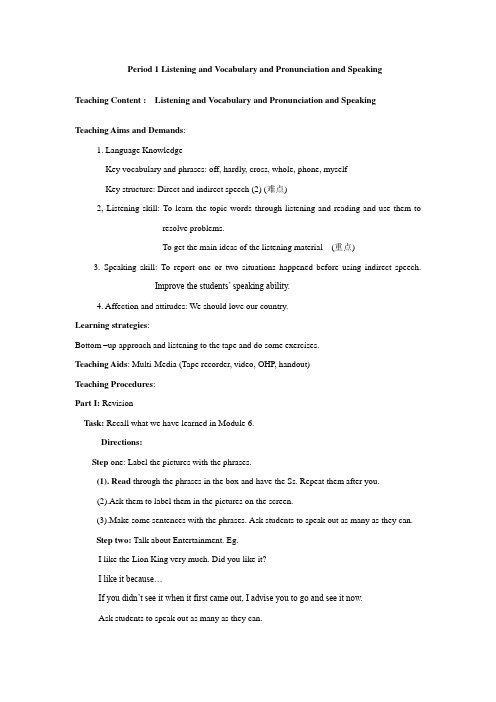
Period 1 Listening and Vocabulary and Pronunciation and Speaking Teaching Content : Listening and Vocabulary and Pronunciation and SpeakingTeaching Aims and Demands:1. Language KnowledgeKey vocabulary and phrases:off, hardly, cross, whole, phone, myselfKey structure: Direct and indirect speech (2) (难点)2, Listening skill: To learn the topic words through listening and reading and use them toresolve problems.To get the main ideas of the listening material (重点)3. Speaking skill: To report one or two situations happened before using indirect speech.Improve the students’ speaking ability.4. Affection and attitudes: We should love our country.Learning strategies:Bottom –up approach and listening to the tape and do some exercises.Teaching Aids: Multi-Media (Tape recorder, video, OHP, handout)Teaching Procedures:Part I: RevisionTask: Recall what we have learned in Module 6.Directions:Step one: Label the pictures with the phrases.(1). Read through the phrases in the box and have the Ss. Repeat them after you.(2).Ask them to label them in the pictures on the screen.(3).Make some sentences with the phrases. Ask students to speak out as many as they can.Step two: Talk about Entertainment. Eg.I like the Lion King very much. Did you like it?I like it because…If you didn’t see it when it first came out, I advise you to go and see it now.Ask students to speak out as many as they can.Part II: Lead in:Task 1 : Introduce to them the new words .Directions:Step one: Re ad through the new words and phrases and have the Ss. repeat them after you chorally and individually.Step two: Ask the students to talk about the pictures on the screen.Step three: Collect some descriptions in a whole- class setting.Step four: Pair the Ss to discuss what else they know about Beihai Park.Step five: Collect any other information they can provide from them and list them on the board.Task 2: Introduce to them Beihai Park.Directions:Step one. The teacher can show them the video abut Beihai Park.Step two: Elicit their Chinese names from the Ss. and write them on the blackboard.Step three: Listen and answer the question in Activity 1 on page 56.Part III: Listening1. Task:. To understand conversations about Beihai Park.Directions:Step one: Let the Ss read through the questions in Activity 2 on page 56.Make sure the Ss. understand the questions.Step two: Play the recording and have them listen.Step three: Play the recording again and have them write the answers individually.Step four: Play the recording and have them check their answer with a partner.Step five: Call back the answer from the whole class.2..Task: activity 4 on page 57.Directions:Step one: Play the recording again and have them choose the best answer in Activity 4. Have them check their answers with a partnerStep two: Play the recording again .Have them check their answers with a partnerStep three: Call back the answer in a whole- class setting.3. .Task: Listen and read:Directions:Step one: Play the recording and ask the Ss. to listen and read the conversation.Step two:Play the recording again and pause after each phrase, asking the Ss. to repeat chorally and individually.Step three: Put the Ss. into groups of 2 to practise the dialogue.Step four: They should repeat it several times, changing the roles each time.: activity 5 on page 57.Directions:Step one: Read through the words in the box with the Ss. Pay attention to the words “environment and protect”, which have the stress on the second syllable.Step two: Have them answer the questions in Activity 5.Step three: Call back the answers in a whole- class setting.Part IV: Pronunciation and SpeakingTask 1 : Listen and repeat the sentenceDirections:Step one: Play the recording and ask the Ss. to listen to the sentences and repeat the sentences. Step two: Ask the Ss to make sure the link sounds. Play the recording again and have the Ss repeat chorally and individually.Step three: Pair them to practise and sum up.Task 2 : Report who spoke to you, what they said, and what you said in a situations. Directions: Put the Ss into pairs. Do activity 7. If you wish, have some students tell the whole class.Part V: A testListen to the tape and translate some of the sentences into Chinese.HomeworkAct out the short dialogue as fluently as possible.。
外研版英语八年级下册Module7_Unit 1 第一课时教案与反思

原创不容易,为有更多动力,请【关注、关注、关注】,谢谢!令公桃李满天下,何用堂前更种花。
出自白居易的《奉和令公绿野堂种花》自主学习方案1.学生自学新词汇(见教材P115),完成学案中相关练习所对应的重点单词。
2.学生自学教材(P56),找出课文中重点词组和句子。
完成学案中相关练习所对应的重点词组和重点句子。
课堂导学方案Step 1 情景导入教师可向学生询问在暑假是否出行过,并邀请部分学生来讲一讲在出行前曾做过什么准备。
环节说明:教师所提的问题及邀请学生们讲述在出行前曾做过的准备都会激起学生学习的兴趣,同时也自然导入了新课程。
Step 2 完成教材1的任务1.仔细阅读任务1的问题,为听力做准备。
2.认真听录音,完成任务1的笔记。
Step 3 完成教材2短文理解1.大声朗读2,找出重难点句子。
2.核对(√)贝蒂对玲玲的建议。
完成任务2的练习,集体核对答案。
3.教师详细讲解。
学生熟记语言重点。
4.播放录音,学生跟读。
5.小结训练。
根据所给汉语提示完成句子。
(1)她正在列购物清单。
She’s making a list of things for shopping.(2)他们将会在这个月底回来。
They’ll come back at the end of this month.(3)你最好向老师请求帮助。
You’d better ask the teacher for help.(4)200美元足够吗?Is 200 dollars enough ?环节说明:通过教师讲解,学生熟记以及听力训练来提高学生的阅读理解能力。
小结训练让学生熟悉教材及重点词组。
Step 4 问题探究1.prepare & be ready for的区别(1)prepare sth.for sb.为某人准备某物;prepare to do sth.准备做某事。
如:I’m busy preparing to go on holiday.我正忙着为度假做准备。
外研版英语八年级下册Module 7 Summer in Los Angeles Unit 1 教案
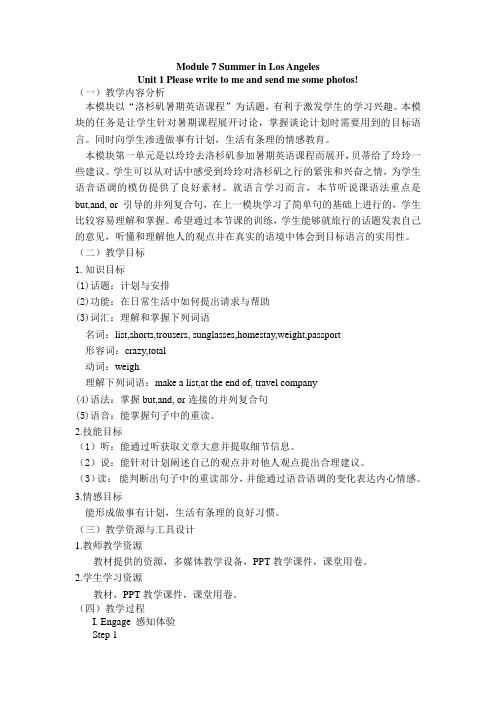
Module 7 Summer in Los AngelesUnit 1 Please write to me and send me some photos!(一)教学内容分析本模块以“洛杉矶暑期英语课程”为话题,有利于激发学生的学习兴趣。
本模块的任务是让学生针对暑期课程展开讨论,掌握谈论计划时需要用到的目标语言。
同时向学生渗透做事有计划,生活有条理的情感教育。
本模块第一单元是以玲玲去洛杉矶参加暑期英语课程而展开,贝蒂给了玲玲一些建议。
学生可以从对话中感受到玲玲对洛杉矶之行的紧张和兴奋之情,为学生语音语调的模仿提供了良好素材。
就语言学习而言,本节听说课语法重点是but,and, or 引导的并列复合句,在上一模块学习了简单句的基础上进行的,学生比较容易理解和掌握。
希望通过本节课的训练,学生能够就旅行的话题发表自己的意见,听懂和理解他人的观点并在真实的语境中体会到目标语言的实用性。
(二)教学目标1.知识目标(1)话题:计划与安排(2)功能:在日常生活中如何提出请求与帮助(3)词汇:理解和掌握下列词语名词:list,shorts,trousers, sunglasses,homestay,weight,passport形容词:crazy,total动词:weigh理解下列词语:make a list,at the end of, travel company(4)语法:掌握but,and, or连接的并列复合句(5)语音:能掌握句子中的重读。
2.技能目标(1)听:能通过听获取文章大意并提取细节信息。
(2)说:能针对计划阐述自己的观点并对他人观点提出合理建议。
(3)读:能判断出句子中的重读部分,并能通过语音语调的变化表达内心情感。
3.情感目标能形成做事有计划,生活有条理的良好习惯。
(三)教学资源与工具设计1.教师教学资源教材提供的资源,多媒体教学设备,PPT教学课件,课堂用卷。
2.学生学习资源教材,PPT教学课件,课堂用卷。
外研版八年级英语下册学案Module7Unit1

科目英语课型读写课年级八年级时间主备同伴授课教师课题:Module7 Summer in Los AngelesUnit 1 Please write to me and send me some photos.学习目标:Knowledge objective1.Key words, phrases and structures.2. 用and, but, or连接的并列复合句。
Ability objective:能听懂和阅读关于介绍洛杉矶之行的语言材料,能通过相关词汇和图片描述自己和他人的旅行经历;能编写关于旅行的对话。
Moral objective:学会倾听他人和分享自身旅游经历,了解他人的旅行快乐,学会分享。
学习重点 1.重点短语与结构。
2.理解文本内容并能复述。
学习难点用and, but, or连接的并列复合句学习过程备注一、【口语训练】A:What do you usually do during the summer holidayB: I usually do my courses and visit my grandparents in the countryside.A: What are you going to do in this summer holiday?B: I will take a trip to Beijing with my parents.A: What will you take for your trip?B: I will take a pair of sunglasses, shorts , comfortable shoes and a T-shirt. I hear that it’s very hot inBeijing. I will take a camera to take photos and some medicine.A: Great! I hope you can enjoy yourself there!B: Thank you, i will!二.【自由讨论】Free talk: Your summer holiday plan.三.【合作探究】Activity two: Listen and read:1. Listen to the conversation and answer following two questions:Q1: What is Lingling doing ?___________________________________________________________.Q2: When will Lingling leave and how long will she stay there?___________________________________________________________.Activity three:. Read the conversation after the tape and finish activity 2.2. Read the conversation in role and find out following phrases.列一张单子______________________ 准备好______________________在……的末端______________________在那里待四周______________________付款______________________ 还有什么______________________最好做……___________________顺便说一下______________________忘记做某事_________________ 给某人写信______________________Group competition: 比一比看谁快又准。
外研版英语八年级下册Module7 Unit1 参考教案
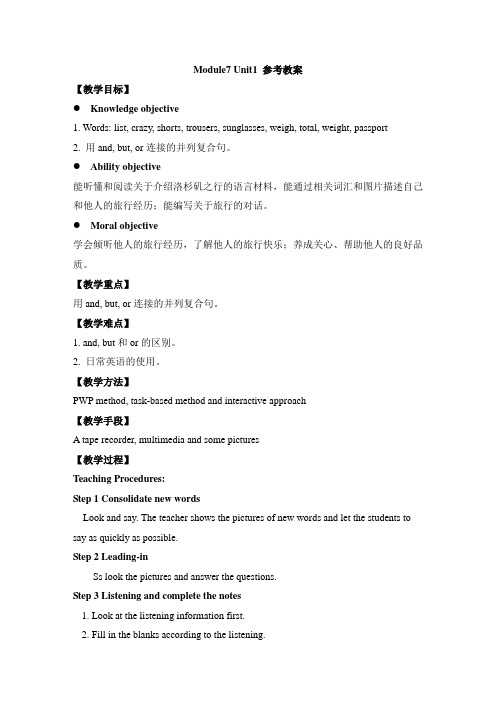
Module7 Unit1 参考教案【教学目标】●Knowledge objective1. Words: list, crazy, shorts, trousers, sunglasses, weigh, total, weight, passport2. 用and, but, or连接的并列复合句。
●Ability objective能听懂和阅读关于介绍洛杉矶之行的语言材料,能通过相关词汇和图片描述自己和他人的旅行经历;能编写关于旅行的对话。
●Moral objective学会倾听他人的旅行经历,了解他人的旅行快乐;养成关心、帮助他人的良好品质。
【教学重点】用and, but, or连接的并列复合句。
【教学难点】1. and, but和or的区别。
2. 日常英语的使用。
【教学方法】PWP method, task-based method and interactive approach【教学手段】A tape recorder, multimedia and some pictures【教学过程】Teaching Procedures:Step 1 Consolidate new wordsLook and say. The teacher shows the pictures of new words and let the students to say as quickly as possible.Step 2 Leading-inSs look the pictures and answer the questions.Step 3 Listening and complete the notes1. Look at the listening information first.2. Fill in the blanks according to the listening.Step 4 Listening1. Listen to Part 2 and answer the following questions.1) Where is Lingling going?2) Are many things more expensive in America?2. Now check the things Betty suggests Lingling take.1dollars 4 T-shirts 7 passport2shorts 5 pens 8 sunglasses3Jeans 6 a dictionary 9 notebooksStep 5 Reading1. Find sentences in the conversation which suggest that …1 Lingling wants help.2 Betty is glad to offer help.3 Lingling asks for more help.4 Betty tells Lingling to remember something important.2. Read Part 2 and mark T or F.1 Lingling is leaving at the end of June. ( )2 Lingling is going to stay in China. ( )3 Betty’s going to stay in LA for four weeks. ( )4 It’s sunny and hot in LA in July. ( )5 Betty wants Lingling to write to her and send her some photos. ( ) Step6 Everyday EnglishLet Ss say what they have learnt in the passage.Step 7 Language pointsSs should master the main points from the passage in Part 2. If possible, let the students to say at first.1. I’m making a list of things for my trip.make a list “列清单“。
第二课时外研版英语八年级下册Module7Unit1教学设计
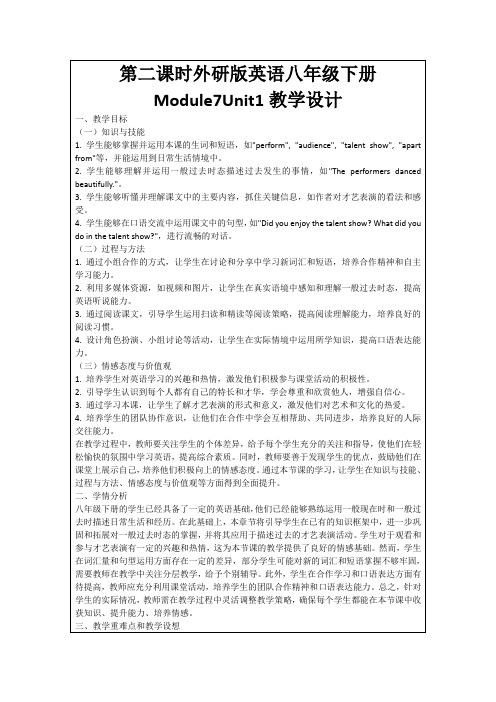
(三)学生小组讨论
1.教师将学生分成小组,每组讨论一个话题:“If you were in a talent show, what would you perform and why?”,鼓励学生运用一般过去时进行表达。
(二)讲授新知
1.教师带领学生阅读课文,让学生跟读并注意语音、语调,培养良好的发音习惯。
2.教师讲解课文中的重点词汇和短语,如"perform", "audience", "talent show"等,并通过例句展示其用法,帮助学生理解记忆。
3.教师引导学生关注课文中的一般过去时态,让学生观察、总结一般过去时的构成和用法,同时进行板书,强化学生的记忆。
难点:学生运用扫读和精读等阅读策略,深入理解课文内容,并进行有效的信息提取。
3.重点:通过小组合作和角色扮演等活动,提高学生的口语表达能力。
难点:学生在口语交流中克服紧张情绪,自信地运用所学知识进行表达。
(二)教学设想
1.针对教学重点和难点,采用任务型教学法,设计丰富的课堂活动,引导学生积极参与,提高他们的实践操作能力。
2.课后阅读:推荐学生阅读一篇关于才艺表演的英文文章,要求学生在阅读过程中注意理解文章中的关键信息,提高阅读理解能力。
3.口语作业:学生与家长或朋友一起,用英语分享自己在课堂上学到的才艺表演经历,要求运用一般过去时态进行表达。此举旨在培养学生的口语表达能力,并增进与他人的沟通。
4.词汇巩固:请学生整理本节课所学的词汇和短语,用卡片或笔记本记录下来,以便随时查阅和复习。
- 1、下载文档前请自行甄别文档内容的完整性,平台不提供额外的编辑、内容补充、找答案等附加服务。
- 2、"仅部分预览"的文档,不可在线预览部分如存在完整性等问题,可反馈申请退款(可完整预览的文档不适用该条件!)。
- 3、如文档侵犯您的权益,请联系客服反馈,我们会尽快为您处理(人工客服工作时间:9:00-18:30)。
课前需准备好以下资料
1.课前读M7单词P115
2. 英语课本,并翻到P56.
Module 7 Unit 1 Please write to me and send me some photos. Studying aims:
1. To listen and understand the conversation about holiday trips and future plans
2.To learn some key words and useful expressions
3.To get specific information from a conversation on a person’s trip
4. To talk about a trip to LA
I . Warming up
1.Do you like travelling?
2. Do you want to have a trip in America?
3.What will you take for a trip?
II . Listening
A1. Listen and complete the notes.
1.Where Daming and Lingling are going:
_____________________________________
2.What they are going to do:
_______________________________________
3.How long they will stay:
_______________________________________
4.How many students there are in the group:
______________________________________
A2 .Listen ,read and complete
What is Lingling doing? She is ______________ her trip to LA.
What is Betty doing? She is glad to _______help.
When is lingling leaving? She is leaving __________________.
How long will she stay there? She will stay there__________________
What does Betty advise Lingling to ask the travel company about?
She advises Lingling to ask about ________________for the bags.
III. Read aloud
1.Read by yourselves and understand the conversation.
2.Read in roles. (Lingling and Betty)
nguage points
1.1.Lingling is preparing for her trip to LA.玲玲正在为去洛杉矶旅行做准备。
1)prepare sth 准备某物2)prepare to do sth. 准备做某事3)prepare for sth. 为…做准备
e.g.妈妈总是为我们准备晚饭。
Mother always _______________________for us.
e.g.把收音机关小点,我准备做作业了。
Please turn down the radio. I__________ my homework.
e.g.同学们正在为野炊做准备。
The students______________________ the picnic.
2. I like to get things ready earlier.我喜欢早一点把东西准备好。
prepare for=get ready for为…而做好准备get sth ready 准备好某事
1). He ____________ this trip to LA last night.
2). My mother has____everything ____ when I came home.
3. I’m making a list of things for my trip.
make a list “列清单“make a list of …“列…的清单”。
e.g.让我们列一张购物购物清单。
Let’s _____________________________.
e.g.我通常去购物前把所需买的东西列一份清单。
I usually _____________ things before going shopping.
4. I’m leaving at the end of July.
1) be leaving “将要离开”
方位动词leave, come, go, fly用现在进行时表示将来。
e.g.他不久就来佛山了。
He____________ to Foshan soon.
e.g.下周我将飞往洛杉矶。
I ___________to LA next week.
2)at the end of …“在…的结尾,在…的末端”。
后接时间或物体或者场所。
e.g.她说她这个月底就来了。
She says she is coming ____________this month.
e.g.这间医院在这条街的尽头。
The hospital is _____________ the street.
3)in the end=at last=finally 最后,后不能接of
练习:He fell down _____________ the match.
A. at the end of
B. in the end of
C. by the end
5.Shorts are good, or you can wear light trousers.
__________________________________________________________________________ __________________________________________________________________________ 1).His shorts_______(look) cool.
2).A pair of sunglasses _______(make)him cooler.
3).Many pairs of trousers _____(be)on sale over there.
4).My glasses are broken. I need to buy a new______.
A. one
B. glasses
C. pair
5.If you’ve already paid for the air tickets...
1). pay for sth 付款买…;支付…的费用
2). pay +钱+for sth 花钱买某物
3). pay sb+钱for sth 向某人付钱买某物
e.g.我已经付了这三本书的钱. I __________the three books.
e.g.他昨天花了2000元买了那只表。
He _____________________ the watch yesterday.
e.g.他向我支付了100万买了那套房子。
He_________________________ the house.
V.小结(重点短语和句子)
1.为…做准备
2.列清单
3.使…准备好
4.听起来荒唐的
5.在…的结尾
6.支付
7.最好做某事8.顺便说9.太多
VI. Practice and homework.。
